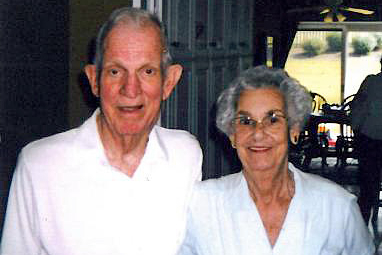 RICHARD VANHALANGER and wife
RICHARD VANHALANGER and wife
PITTSBURGH–Richard VanHalanger, 83, was independent when he walked into the Cedars of Monroeville nursing home in 2006 for two weeks of rehabilitation before heart surgery.
He drove. He attended church. He played golf.
By the end of two weeks at the home, his daughter, Valerie Warning, said he had lost both strength and pride because of the staff’s actions:
Nurses and aides had used restraints to keep her father in a wheelchair and routinely disconnected call bells he could use to signal for help, she said. Instead of walking with him to the restroom, they forced him to wear diapers and left them soiled, leading to rashes and sores.
After five months in the home, VanHalanger was admitted to the hospital for pneumonia and died a week later.
A lawsuit alleging that VanHalanger received insufficient care by an untrained staff at Cedars was settled last year and his family was awarded $250,000; the nursing home denied any fault and said the allegations were “unfounded.”
“It’s still hard on me because I made the decision to put him in that home,” Warning said.
Pennsylvania, with the fourth highest percentage of people 65 and older in the United States, has an extensive network of senior care facilities. As families find their parents or grandparents needing care, they are thirsty for information about nursing homes, which cost an average of $8,000 a month in the state, and their services and deficiencies.
This summer, the U.S. Centers for Medicare and Medicaid Services (CMS) answered the calls of elder advocates to publish online the full text of federal nursing home inspection reports. So far, it has uploaded inspections for about three years.
In an analysis of the newly available information by PublicSource, with the help of a program developed by Manhattan-based ProPublica, southwestern Pennsylvania stands out for all the wrong reasons.
More deficiencies were issued in Pittsburgh than any other city in the state, including the much larger Philadelphia. Inspectors gave 446 deficiencies to 35 Pittsburgh nursing homes in three years, the data showed.
Pittsburgh has a rate of about 4.25 deficiencies per year for each nursing home. The national average is six to seven deficiencies per inspection, according to CMS. (The deficiencies are graded A through L, with the worst problems receiving the L grade.)
In addition, six nursing homes in Western Pennsylvania accounted for the majority of the state’s worst scores, which meant residents in those homes were in “immediate jeopardy.”
Nursing homes in Pennsylvania are required to have the most recent inspection report on hand when the public asks for them and the narratives have long been available online, but people who need the information don’t always know what’s available and the state databases are difficult to navigate.
Warning, for example, said she was never informed that the inspection reports from the Pennsylvania Department of Health were online when she was looking for a place for her father.
“I was shown and told only what would sell me on putting my father there,” she said.
Information that family members can access and understand helps to protect the elderly, said Karen Chenoweth, an advocate with the Philadelphia-based Center for Advocacy for the Rights and Interests of the Elderly (CARIE).
“We are giving our most vulnerable loved ones to them and trusting they will do the best for them and not their profit margin,” said Chenoweth, who supervises online counseling services for CARIE. “We need the information out there for everyone to scrutinize their actions.”
Problems in Western Pennsylvania
The Cedars of Monroeville, where Warning’s father lived, was one of six nursing homes in a 10-county region of Western Pennsylvania that accounted for the majority of the state’s worst scores.
The five other facilities — located in Westmoreland, Allegheny and Lawrence counties – were Caring Heights Community Care & Rehab Center in Coraopolis, Edison Manor Nursing & Rehabilitation Center in New Castle, West Haven Manor in Apollo, Mountainview Specialty Care Center in Greensburg and Latrobe Health and Rehabilitation Center in Latrobe.
Cedars received one K rating in the past three years, according to the PublicSource analysis. In June 2010, a steam table that contained water as hot as 185 degrees was regularly left simmering in a kitchen open to seven cognitively impaired residents, the inspection report stated.
The facility was fined more than $10,000 for that deficiency and another violation, according to the Medicare website. It corrected the hazard.
The Mountainview Specialty Care Center in Greensburg and the Latrobe Health and Rehabilitation Center in Latrobe earned grades of L in May 2011 and May 2012, respectively.
Mountainview’s failing grade came because the facility left gates and doors unlocked at all times, leaving 117 residents vulnerable, according to the inspector’s report.
The center implemented a locking system the day after the report.
“We are dedicated to providing our residents with high quality, compassionate care and to providing peace of mind to their families and caregivers,” Mountainview Administrator Kris Hoke wrote in an email to PublicSource.
The 107-bed Latrobe center was given a D grade in November 2011 for a dirty frying pan and for failing to help a resident move closer to the table.
But just six months later, the home received an L after inspectors uncovered nearly $77,000 in unpaid bills for essential services such as food, medical supplies, and water.
The center now makes payments directly rather than through its corporate office, according to Department of Health records. The Latrobe facility did not respond to multiple calls requesting comment.